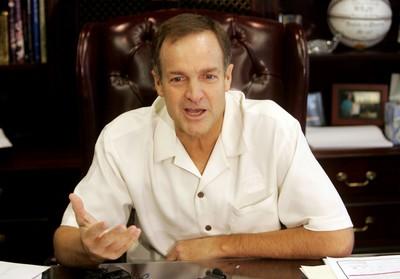UNLV coach takes doctor’s advice to heart
The scars were virtually identical. One 16 inches inside the left arm, the other stretching down Lon Kruger's chest. A couple of souvenirs from his visit to St. Rose Dominican Hospital a week ago.
The UNLV men's basketball coach was back in his office Wednesday, less than a week after undergoing open-heart surgery to remove blockages in his three arteries.
Other than the nasty scars and a bruise on the right side of his neck from the six bypasses, Kruger appeared to be his normal self, ready to guide his team back into the NCAA Tournament.
But the reality is the 54-year-old Kruger is not even close to being ready to stalk the sidelines.
While he intends to be on the floor when the Rebels open practice in mid-October, he still will have to watch himself once the season begins Nov. 9 against Montana State at the Thomas & Mack Center.
Yet, the fact he was on his feet -- much less on the job -- less than a week after the four-hour procedure was amazing.
"I feel great," Kruger said at a news conference in his office two days after being released from the hospital. "Right now, I'm going day to day, and (the doctors) said to do as much as you want without overdoing it."
Dr. V.C. Smith of Cardiovascular Surgery of Southern Nevada said Kruger's actual recovery time is expected to take six to eight weeks. But that doesn't mean he can't work in small increments.
"He was an excellent patient," said Smith, who performed the operation. "He's going to feel some fatigue, but he's not in any danger" by working.
Kruger said he will have to make some adjustments, both in terms of lifestyle and how he handles his coaching duties.
"Obviously, I try to watch what I eat and I try to exercise daily, about 45 minutes on the ellipse machine," he said. "But my routine will change a little bit. I'll probably let an assistant introduce a drill in practice. The doctors said I'll still feel a little fatigued at times. But I'll lean on our staff and we'll be fine.
"We're not trying to be a hero here. Forty-five minutes today (Wednesday). Forty-five minutes tomorrow. I'm not going to push it."
Smith said stress, inherent in the coaching profession, had nothing to do with Kruger's serious condition.
"Stress, in and of itself, isn't the cause," Smith said. "He may have a hectic lifestyle, but heredity was his No. 1 problem. He has a family history of heart problems."
Kruger's father, Don, had bypass surgery when he was 52 years old and had another at 59. His uncles also had heart issues, Kruger explained.
Six weeks ago, Kruger went to Dr. Joe Johnson, his family physician, for his annual physical. When Johnson saw some irregularities from Kruger's stress test, he investigated further.
The blockages were discovered and, after conferring with doctors Matt McMahon, who administered the stress test, and Jerry Ruth, who read the scan, it was determined Kruger would undergo the bypass procedures, which were performed by Smith.
"It was a team effort," Kruger said, in typical coach-speak, of his doctors. "They did a tremendous job."
In June, Kruger received a five-year contract extension after guiding the Rebels to the NCAA Tournament's Sweet 16 in March. However, nowhere in his contract does it stipulate that he must pass a physical in order to fulfill his coaching obligations.
"I don't know that it should be in the contract, but everyone should do it," Kruger said of having a stress test as part of a complete physical. "It's something I do every year."
Kruger's wife Barb said she was glad her husband took preventative measures to avoid a worse fate.
"Lon never shows any stress," she said. "One of his comments is, 'You can't stress over what you can't control.' We just feel very fortunate Dr. Joe wanted him to get that stress test."
Kruger said he and his fellow basketball coaches talk about the need to take care of themselves.
The July 26 death of Wake Forest coach Skip Prosser from a heart attack after jogging resonated throughout the coaching community about the need of taking better care of one's self.
In Kruger's case, he was already ahead of the curve. By discovering the blockages in his arteries and having them cleared, he was able to avoid the potential of a heart attack.
Kruger said he appreciated the outpouring of support from the community, and he hoped everyone will take the necessary steps to get checked.
"I think a lot of good will come from this," he said. "I feel almost guilty sitting here. We were fortunate and blessed. There's no 'Woe is me' here.
"The support from the community has been unbelievable. We appreciate that. I think it reinforces the reason we wanted to come here (to Las Vegas)."
UNLV Basketball

















